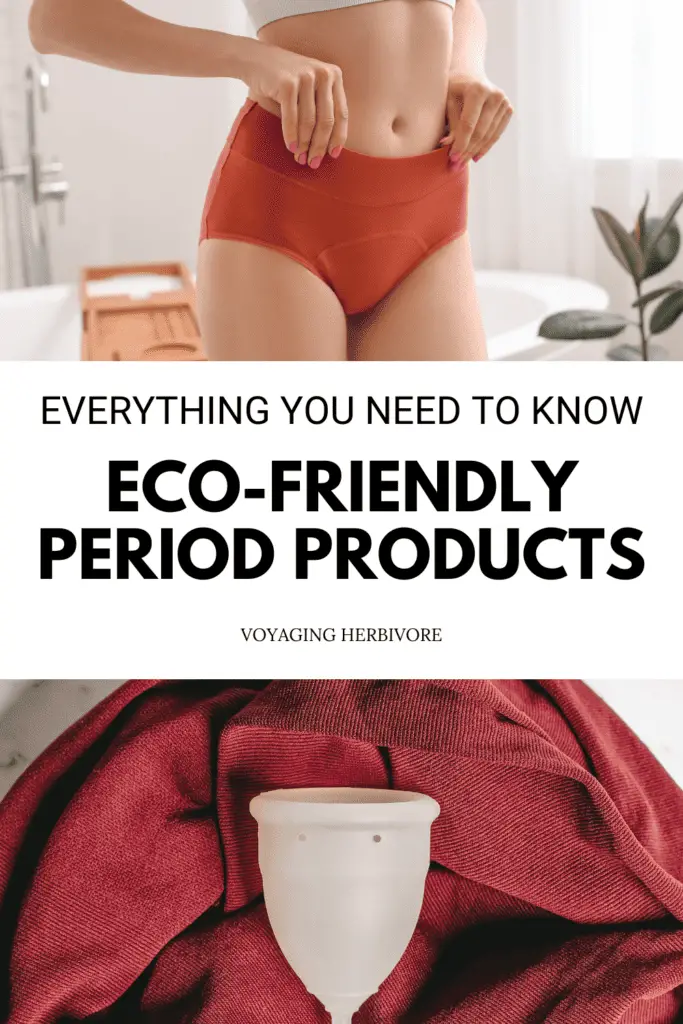While menstruating you are probably in too much pain to think about eco-friendly period products, but when the cramps pass there is something you should consider for your next period, and that is to switch to sustainable period products. As a newbie, you might think this is too difficult to do, but recently there have been more and more options on the market, and the swap can be simple and painless.
We tend to think about our period as something negative, painful, and annoying. But how do we change that thinking to something more mindful and positive? You can start by choosing one of these products to try next month, and while feeling blue you will have one positive thing to be proud of creating less waste for the world.
Read More: 6 Ethical Alternatives to Amazon
Table of contents
Benefits of Eco-Friendly Period Products
You may have been doing this for a while and have a well-honed regimen and favourite goods. Maybe you’re new to this scene and feel overloaded by the amount of information being presented to you. Whatever your reasoning for wanting to have an eco-friendly period, here are some benefits to consider.
It Is Cheaper
Annual costs for disposable tampons and pads can go up to £500. Throughout a menstruator’s lifetime, that’s a sizable sum of money. Most women spend around £40 for managing their periods.
Everyone utilises reusable items differently and for varying amounts of time. An annual cost estimate is challenging. Reusable items are less expensive in the long term, and those of us who have periods are in them for the long haul.
It Is Eco-Friendly
Using reusable environmentally friendly period products reduces waste. Menstruators use between 5000 and 16000 tampons and pads in their lifetime. These disposable menstrual items, which are dumped in landfills in the billions each year, are not biodegradable.
That implies that they will continue to exist after us. Reusable feminine hygiene products reduce the amount of waste and non-biodegradable items in our landfills. With emissions and other trash, the manufacturing process also harms the environment.
It Is Better for Your Health
Herbicides and pesticides may be present in disposable feminine hygiene products. Additionally, they may contain the carcinogen dioxin. The quantity is insignificant and won’t cause any harm.
Although the amount of dioxin in a single disposable product is small, scientists have observed that ongoing exposure can lead to an accumulation of exposure that has harmful health effects. Additionally, disposable goods can irritate the skin and trigger allergic reactions. Products made of organic cotton reduce the incidence of certain ailments.
What Eco-Friendly Period Products Are Available in the UK?
With more options than ever, several companies are offering eco-friendly substitutes, from fashionable period underwear that you’ll want to wear even when you’re not on your period to organic cotton tampons with plant-based applicators. The menstrual cup is another important purchase for individuals looking to minimise period waste.
Tampons
In terms of environmental impact tampon is among the worst products. Most tampons are wrapped in plastic, made of absorbent materials like rayon, plastic, or a combination of rayon, cotton, and synthetic fibres, and frequently contain plastic applicators and strings made of polypropylene or polyester.
Although tampon applicators aren’t strictly necessary, marketers have advertised them to take advantage of the stigma associated with women touching their menstrual blood and their genitalia. In Europe and Australia, tampons are mostly sold without applicators, but the rest of the world is another story.
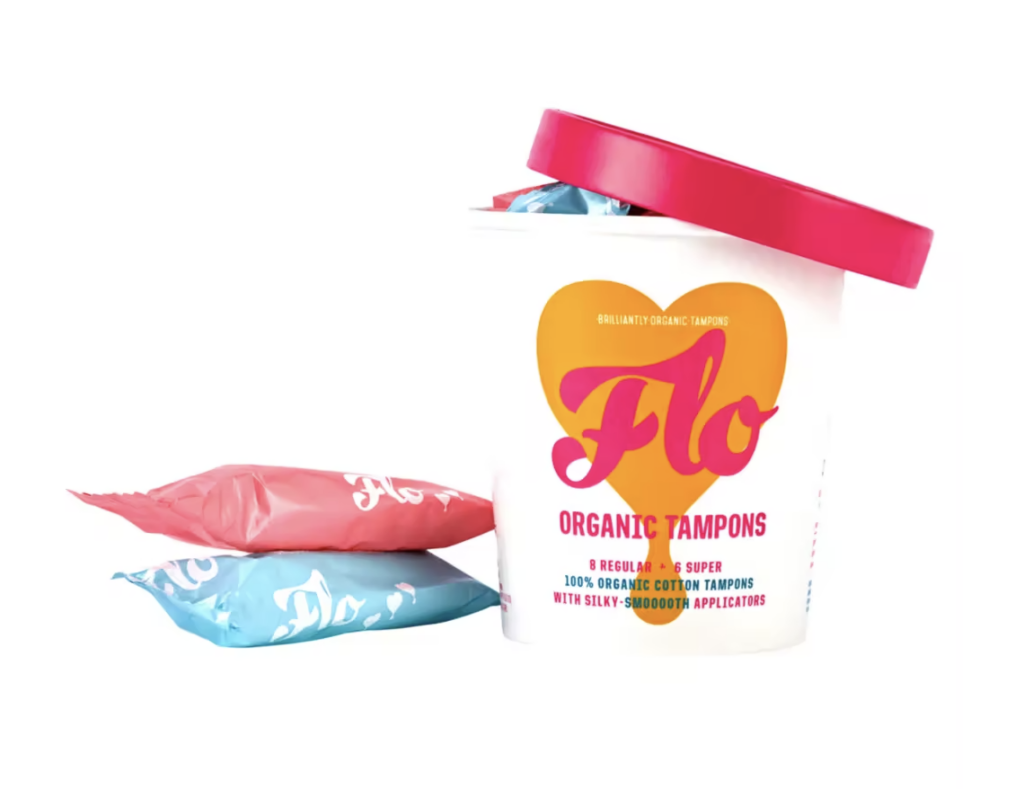
Low-density polyethene, an energy-intensive and environmentally hazardous plastic that is utilised in tampon applicators, is employed in their construction. Applicators are constructed of recyclable materials, but because they are regarded as medical waste, they are not accepted.
To reduce their usage of single-use plastic, some menstruating people opt to use reusable tampon applicators and naked tampons. These eco-friendly menstrual products are not only better for the environment, but also you are not using products that can be harmful to your body in the long run.
Cardboard applicators can be recycled, while organic tampons as well as pads made of natural materials like bamboo or cotton can frequently be composted in municipal composting facilities. However, even cotton needs six litres of water to develop just one bud, and the majority of cotton that isn’t organic is drenched in poisonous chemicals and insecticides.
Combination tampons and liners made of biodegradable cotton, which are used by menstruating women with high flows and those who use pads or panty liners in addition to tampons to stop leaks, can help reduce waste and shorten the time they spend in landfills.
Where to buy
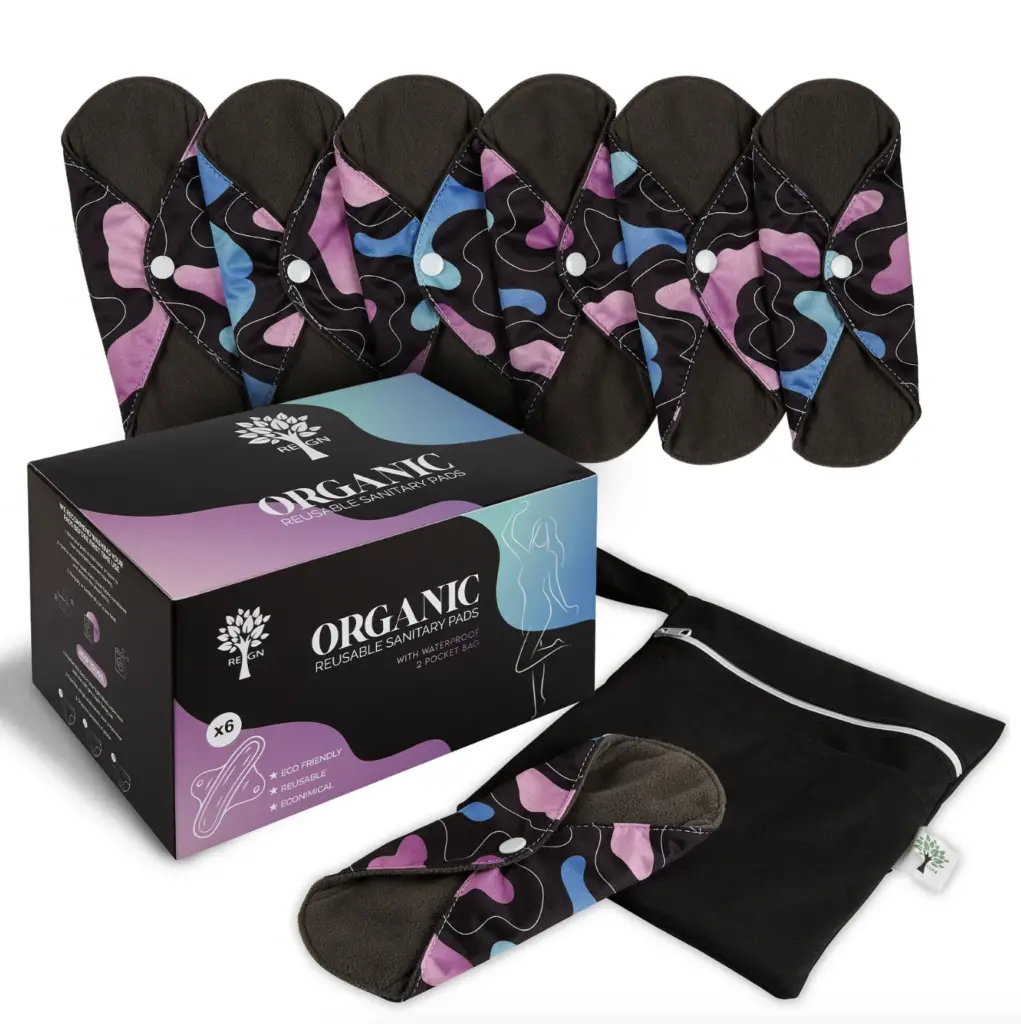
Pads
Although they are more expensive up front, reusable cloth pads are more economical than disposable ones because they last three to five years and can replace hundreds of pads and tampons. There are layers of synthetic fibres in standard disposable pads. These layers comprise an absorbent polymer-filled middle and a waterproof plastic backing to help stop leaks. All these materials are very bad for the environment and can be unhealthy for you too.
Period pads that can be reused not only decrease your plastic waste but also have other advantages. Because you don’t have to buy products every month and because they don’t contain the potentially dangerous chemicals that disposable items can, reusable items save you money.
Reusable menstrual pads are a sustainable substitute for disposable pads. It functions much like an empty pad. It attaches to your underwear and externally absorbs menstruation blood. You rinse, wash, and dry it after using it. After it dries, you can use it again.
Where to buy
Menstrual Cups
Bell-shaped menstrual cups are gaining popularity as the most sustainable period products in recent years. The stem is composed of latex, thermoplastic isomer, or medical-grade silicone. This is the most economical and environmentally responsible choice for an eco-friendly period. Even though they initially cost more, they can be used without access to water or sanitation for 12 hours straight and can last several years.
Menstrual cups are predicted to save a person who uses 2400 tampons or pads in their lifetime and has an environmental impact of less than 1.5% from disposable products. By using a menstrual cup, you can avoid carrying extra pads or tampons, which many women find awkward and heavy.
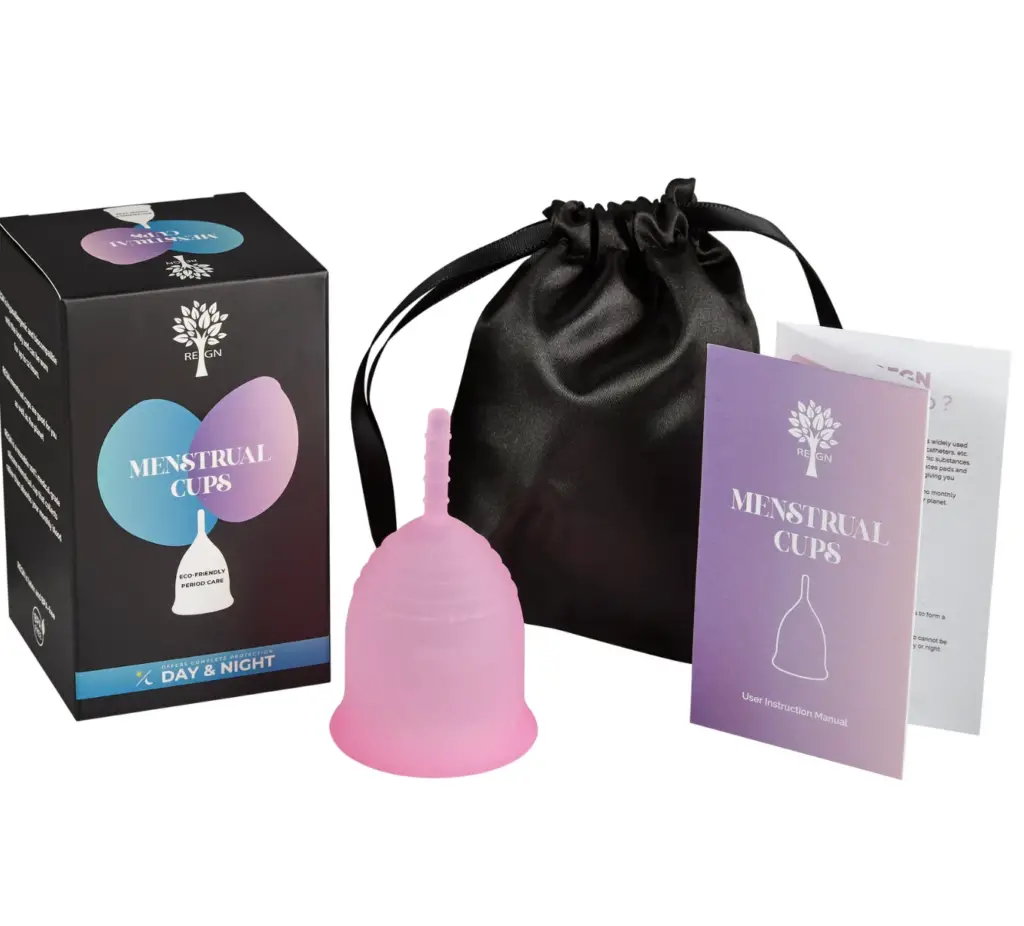
Contrary to tampons, the menstrual cup can be used to prevent first-day leaks by being introduced around the time of an anticipated period. And aside from being eco-friendly, once you get used to them, they are very practical as well.
Where to buy
Period Panties/Underwear
Period underwear is washable underwear that has several layers of absorbent fabric to catch menstrual blood. Menstrual underwear can be worn for the entire day, depending on the wearer’s flow. Period panties do need to be rinsed and washed, however, compared to the manufacturing of disposable period goods, the water usage required for use is still rather low. This is why period underwear is among the most sustainable menstrual products in the market.
Because numerous pairs of period underwear are required for each cycle, they are more expensive than alternative options for period products. However, this initial cost will save you money on a yearly level, because these undies last long and are very comfortable. They are especially great for those who have irregular periods and don’t know when their next period will come.
Where to buy
Eco-Friendly Period Products FAQs
Some of the most eco-friendly period products are menstrual cups, reusable pads, and period underwear. Menstrual products that are reused may not be fully safe for the environment, but they may be less harmful than single-use goods.
Period products are very bad for the environment, from making massive waste in landfills to also having an impact on marine biodiversity and the world’s oceans. Microplastics are created through the disintegration of disposable goods and the plastic that surrounds them. Ocean biomes are seriously threatened by microplastics, which have been found to disrupt marine ecosystems.
No, the regular pads are not environmentally friendly, because most of them are made out of plastic and toxic materials. Most pads contain about 90% plastic.
Eco-friendly means that it is not harmful to the environment. Biodegradable means that the item will be broken down naturally by the organisms in the ecosystem. So, biodegradable is more eco-friendly than items that are not biodegradable, but keep in mind that biodegradable items also end up in landfills.
Using reusable pads can lower your carbon footprint, help you live more happily with Mother Earth, and save you up to 300 pounds of waste throughout your lifetime. Less waste is always better for the environment, and also for your health.
With so many options available, it’s never been easier to switch from the plastic-filled kinds of tampons, pads, cups, or period-proof underwear, even if each person who menstruates has their preferences. Start with small changes before going completely to zero waste, and buy reusable pads or period-proof underwear.
Keep Reading
- 6 Ethical Alternatives to Amazon
- 4 Ways You Can Travel More Sustainably
- The ULTIMATE Guide to Planning a Sustainable Europe Road Trip
- 12 Eco-Friendly Travel Products You Need to Invest In
- 9 PERFECT Sustainable Gift Ideas For Travel Lovers
- 10 Cheap & Easy Ways to Reduce the Use of Plastic | Travel Edition
- The Ultimate Guide to Eco-Friendly Straws
- 10 Cheap & Easy Ways to Reduce the Use of Plastic | Travel Edition
- Eco Travel: 16 Expert Tips And Free Checklist
- 13 Spectacular Eco Hotels You Need to Visit
- Jackery Explorer 500 Review: Do NOT Buy Until You Read This
Free Resources


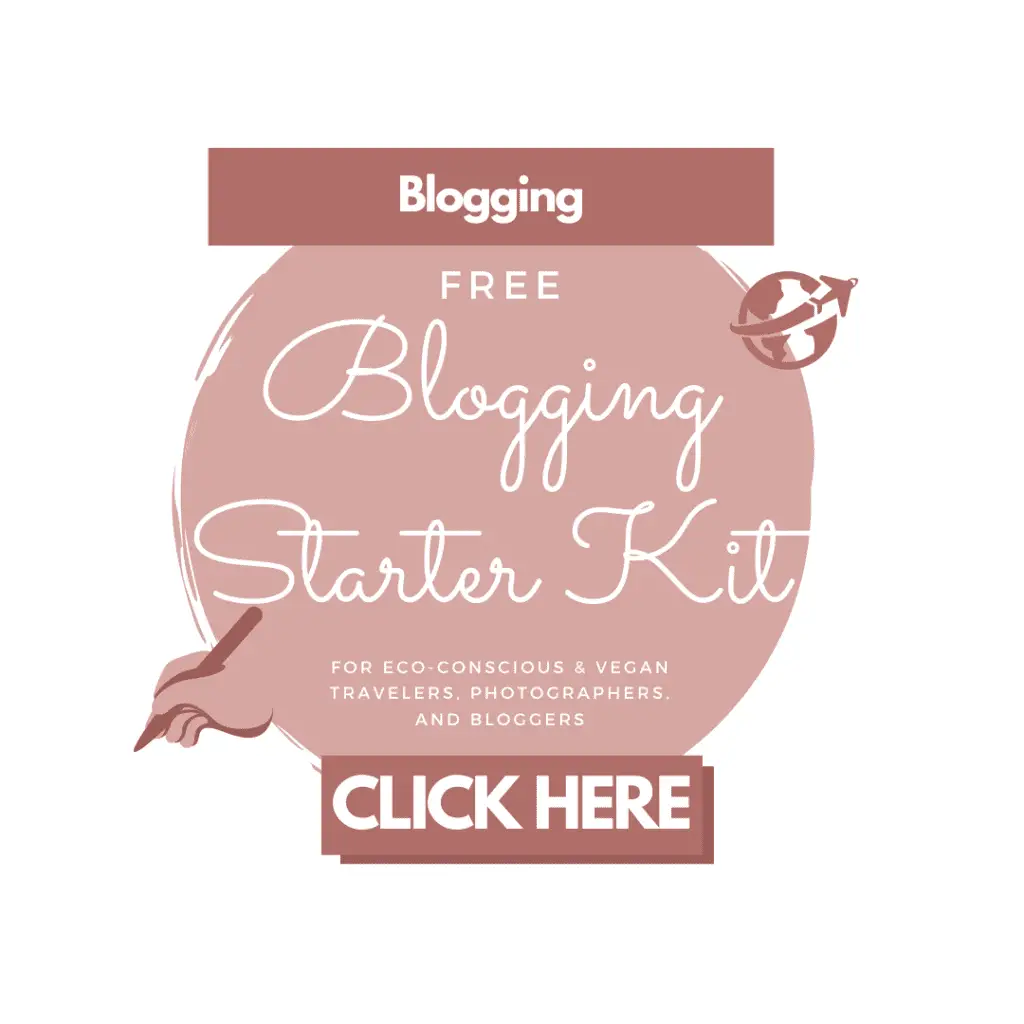


And as always, you can find more sustainable travel content on Instagram @VoyagingHerbivore, Youtube, and TikTok and to get updates straight to your inbox, enter your email below.
If you found this guide helpful and want to help us keep these resources free,
please consider making your next Amazon, Expedia, Hostel World, Etsy, Trivago, and Booking.com purchase through our links (just click right on those words – you can do it right now and unless you clear your cookies before your next purchase, it will remember). It costs you no extra and gives us a small commission. Thank you!
Pin Eco-Friendly Period Products
